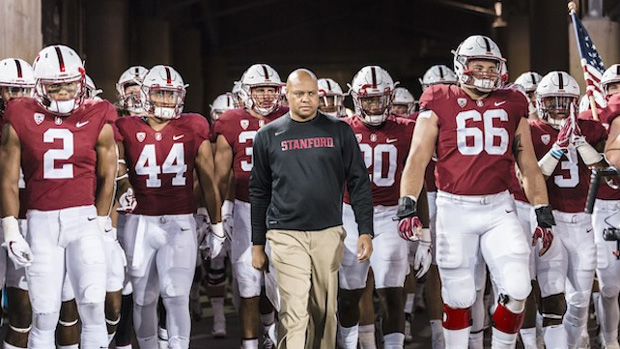| 'Intellectual Brutality': The Value Behind Stanford Football's Sustained Success |
| By: Brandon Hall
Provided by: STACK It's the motto that's propelled Stanford football to new heights. Since 2010, only Alabama, Ohio State and Clemson have won more games. If the Cardinal earn a win in either the Pac-12 Championship or their bowl game, they'll secure their seventh double-digit-win season in the past eight years. It's been a remarkable turnaround for a team that won precisely one bowl game between 1993 and 2009, and it all comes back to intellectual brutality. The motto was popularized by David Shaw, who's been the team's head coach since 2011. It's emblazoned on their attire. A sign claiming "The Home of Intellectual Brutality" hangs in their locker room. It's on the posters they mail out for recruiting camps. When the team received their 2016 Rose Bowl rings, they saw the words "Intellectual Brutality" staring back at them. The motto has become a part of Stanford football's DNA. But what does it really mean? It's no surprise to hear the word "intellectual" associated with Stanford, a school often referred to as "The Harvard of the West." The team's graduation rates top the Pac-12 year after year. The program has been awarded the American Football Coaches Association's Academic Achievement Award in four of the past five seasons. Stanford's run-heavy attack relies on moving people against their will - a task that takes brutality. The Cardinal, who currently average 210.2 rushing yards per game, have long boasted a ground game that slowly overpowers opponents. But Stanford hasn't built its program on players who're capable of being either intelligent or physical - they've built it on players who're capable of doing both simultaneously.
"We always talk about intellectual brutality. I like to form my game around that. You think of brutality where you're out of control at all moments and you're just going crazy. But I add the intellectual part because you're under control, you know what's going on and you know what's going to happen next. You just bring that physicality to it, and it's game over," Blake Martinez, a former All-Pac-12 linebacker at Stanford who's with the Green Bay Packers, said at 2015 Pac-12 Media Day. That's how intellectual brutality can be defined on the field, but the motto permeates every aspect of the program's culture. The philosophy plays an especially important role in the Cardinal's recruiting. Not only do they seek young men who can play a punishing brand of football, but they also should be eloquent and self-assured. Shaw pays close attention to a recruit's vocabulary for exactly such reasons. "You look for vocabulary…Can this kid express himself in a way that befits a Stanford man?" Shaw told Yahoo! Sports. "(We seek) a young man that has the confidence to stand up in front of you and express himself as opposed to what a lot of young kids do today - they don't give you eye contact, they kind of mumble when they talk to adults." Shaw sees a direct relation between how these recruits carry themselves off the field and how they carry themselves on it. "You walk around and talk to our kids, they look you in the eye," Shaw said. "And we play that way. We are going to play right at you, in your face, 'Here is who we are, here is how we play.' There is a one-to-one correlation. There is no doubt about it to me. The inability to be intimidated by a person or a situation is something that is significant." The team even brings its own brand of intelligent brutality to the weight room. Picture how a typical brute, defined as "a savagely violent animal or person," would train. They'd probably go full meathead and try to lift every plate in the gym, right? Shannon Turley, Stanford's Director of Sports Performance, ensures the team takes a much more cerebral approach. "I don't care how much guys can Bench, Squat or Power Clean," Turley told Bleacher Report. "(That) has nothing to do with playing football. Football is blocking and tackling. It's creating contact, avoiding contact and gaining separation if you are a skill guy on the perimeter." David Yankey, a former All-American guard at Stanford who's now with the Carolina Panthers, could barely bench his own body weight in college. The aim isn't to build Herculean raw strength, but rather functional athletes who're resistant to injury. That means a major focus on mobility, stability, flexibility and core strength. Turley calls it "real-world functional man strength." He customizes every player's program to their individual needs, integrating many of the same movements they'll need to make on Saturdays. The workouts are far from easy, but every rep serves a purpose. They're brutal, but intelligent. You might expect a coach who preaches "brutality" to be hot-tempered and boorish, but Shaw always manages to get his point across with poise. He believes actions speak louder than words, and his players often follow suit. "He's not going to yell at you, get in your face and scream at you, all that stuff," former Stanford running back Christian McCaffrey, now a member of the Carolina Panthers, told ESPN. "He's someone who really exemplifies leadership being not spoken but demonstrated through actions." Intellectual brutality is more than a motto - it's the beating heart of Stanford's program. It's how they've managed to lose uber-talented players like McCaffrey and see little drop-off in success. Recruits have taken notice, as the Cardinal's most recent class included the top-ranked quarterback in the nation and two five-star offensive tackles. Could intellectual brutality one day lead Stanford to a national title? If it ever happens, you'll likely hear a lot more about the two words that helped turn an also-ran into a perennial powerhouse. Photo Credit: David Madison/Getty Images |







